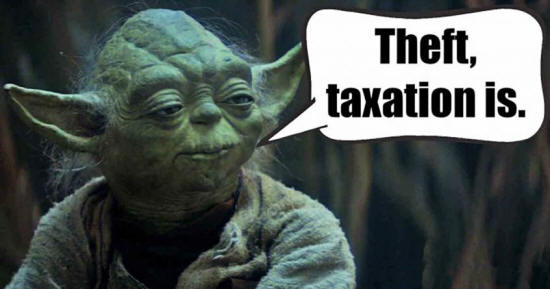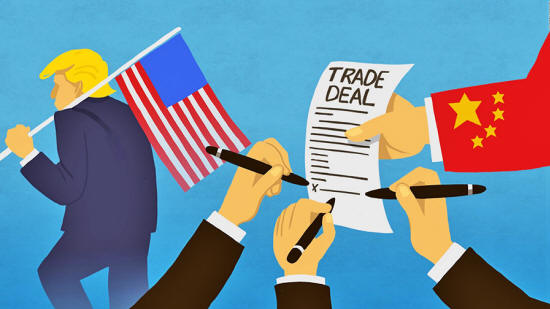|
from TheFreeThoughtProject Website
PART 1 April 02, 2017
Before discussing a
number of impressive solutions - many already functioning full steam
ahead, sans interference - it's necessary to understand the coercive
nature of taxation, itself.
Your money will be spent - you just don't have a say so.
Where businesses and charities not tied to the government must deliver quality services to satisfy funders and compete with similar organizations - primarily by cutting waste and reducing inefficiency - government agencies, saddled with a steady and ever-increasing influx of funding, aren't beholden to pragmatism.
Government bookkeeping is
a notorious fiasco.
There are solutions.
For example, the Institute suggests,
Although the idea might
be difficult in a nation whose recalcitrance drowns out the loudest
call for sweeping reforms, wresting your own money from the State's
bureaucratic and regulatory quagmire and directing it to programs of
your choice hardly constitutes radical engagement.
How to make that reality
- as seen in the number of groups already subverting the ailing
system - will be a pleasant surprise discussed in 'Part Two' of this
two-part series.
PART 2
Under construction...
from WolfStreet Website
This comes after the bank was fined $2.6 billion by the U.S. government in 2014 for helping Americans evade taxes. Helping high net worth private clients and corporations evade taxes, and then getting caught is not unique to Credit Suisse.
Fellow Swiss megabank UBS and UK giant HSBC were fined hundreds of millions of dollars for their troubles. The banks are not just helping their clients evade taxes.
In a report titled Opening the Vaults, UK-based charity Oxfam International revealed this week that in 2015, Europe's 20 largest banks registered over a quarter of their profits in tax havens - well out of proportion to the level of real economic activity that occurs there.
Once again, Luxembourg was a top destination for funds, while in Ireland the same banks recorded profits that were 76% higher than the global average in 2015.
Only the Cayman Islands was found to have a higher profitability rate.
None of this should come as a surprise. If any organization knows how to bend the rules and use and abuse the tools and levers of global finance to minimize a company or individual's tax "footprint," it's today's generation of global banks.
And no matter how many fines they are made to pay, they're not going to change their ways.
And that is bad news for today's governments, which need increasing amounts of money to meet their obligations and service their debts, as well as rescue the banks every time they get in trouble.
It is also bad news for regular taxpayers since they will have to make up the difference, until that's no longer possible.
The U.S. government alone loses $188 billion of tax revenue each year as a result of tax avoidance, according to calculations by the International Center for Tax and Development.
In China, it's $66 billion; in Japan, $46 billion; in France, $19 billion and in Germany, 15 $billion. But it's the resource-strained economies of the Global South that pay the highest price.
Between 2001 and 2010 alone, it is estimated that developing countries lost US$5.86 trillion to illicit outflows - outflows that in most cases flowed to and through banks in places like Switzerland, Luxembourg, the Netherlands, and the City of London.
According to Oxfam's report, there is one obvious solution to this global problem:
What Oxfam fails to mention is that such a body already exists - the Global Forum on Transparency and Information Exchange for Tax Purposes (GFTIETP).
Most people have never heard of it, but nonetheless its influence is growing.
GFTIETP works under the auspices of the Organization for Economic Cooperation and Development (OECD) and G20.
Developmental NGOs like Oxfam would much prefer to see it fall under the purview of the United Nations where developing nations might have some semblance of influence over proceedings.
The Global Alliance for Tax Justice, of which Oxfam is a sponsor, is calling for the creation of an intergovernmental UN Global Tax Body as part of its Global Week of Action to End Tax Havens, which began today.
For now, however, it's the OECD that's running the show.
And the show is getting bigger all the time. GFTIETP boasts a membership list of over 120 jurisdictions, as well as the Member States of the European Union.
That's over 150 out of the world's roughly 200 nations, representing over 90% of the global economy, that have agreed to share the financial details of their citizens, both private and corporate.
In an article ominously titled "Why Taxation Must Go Global", German Finance Minister Wolfgang Schäuble was barely able to contain his excitement at the prospect of technological advances and global cooperation making it possible for tax authorities to keep ever closer tabs on the people's money:
Over 50 of the Forum's member governments have pledged not only to share tax information on request but also automatically.
The aim is not just to create homogenized standards of financial information sharing that are broadly accepted by governments all over the world, but to have them implemented, says Pascal Saint-Amans, the director of the OECD Centre for Tax Policy and Administration.
Ultimately, the OECD wants to,
The proposals and ideas are all cloaked in positive soundbites, with words like "development," "inclusiveness" and "justice" particularly prominent.
It's also largely true that in an increasingly globalized economy, the only realistic hope national governments have of tapping into the gargantuan - and ever increasing - fortunes of the world's wealthiest individuals and corporations is through cooperating with other national governments and closing down tax havens.
But is that really the main objective here?
After all, it's hard to imagine the same political leaders who casually meet up with CEOs and chairmen of the world's largest corporations in for a such as the annual Bilderberg meeting or the American or European chapters of the Council for Foreign Relations suddenly deciding to throw their primary constituency overboard.
It's more likely that the main targets of the global tax crackdown are not the world's biggest banks and corporations but the proceeds of the informal economy, the fastest growing part of the global economy that is estimated to represent as much as 45% of total global economic activity.
By creating a global cross-reference of everything that moves in the financial world, and by implementing increasingly draconian measures to limit the use of cash-in-fist while promoting the use of digital alternatives, governments will be able to track every penny people earn, spend, or save.
|



